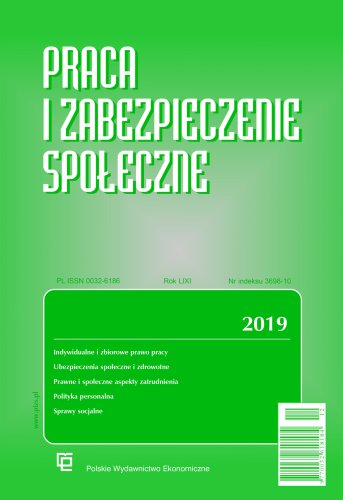Benefit morality: theoretical framework and practical implications
The availability of social benefits is determined by the legal regulations operating in a given country. The actual scope of using these benefits depends, however, on cultural factor, including, in particular, the dominant moral norms. While some individuals (persons, households) abuse welfare benefits, others, on the contrary, do not use them despite appropriate entitlements to do so. This individual attitude to the solutions offered by the welfare state has been described as "welfare morality". This article attempts to conceptualize this term. Presents its essence and practical significance for the welfare system. Moreover, both "deviations" from the optimal usage were discussed: excessive (welfare fraud) and insufficient (welfare non-take-up).
References
Bibliografia/References
Arrow, K. J. (1963). Uncertainty and the Welfare Economics of Medical Care. The American Economic Review, 5(LIII), (141–148).
Błędowski, P. (2018). Polityka społeczna drugiej dekady XXI wieku. Ciągłość czy zmiana? W: M. Krawczyk (Red.), Polska po 2015 roku —gospodarka, społeczeństwo (219–238). Oficyna Wydawnicza SGH.
Brodowska-Szewczuk, J. and Sokołek, M. (2016). Tax Morality — Selected Issues. Journal of Multidisciplinary Engineering Science and Technology.
Chunn, D. E. and Gavigan, S. A. M. (2004). Welfare law, welfare fraud, and the moral regulation of the "never deserving" poor. Social and Legal Studies. doi: 10.1177/0964663904042552.
Elster, J. (1989). Social Norms and Economic Theory. Journal of Economic Perspectives, 3(4), 99–117.
Halla, M., Lackner, M. and Schneider, F. G. (2010). An empirical analysis of the dynamics of the welfare state: The case of benefit morale. Kyklos, 63(1). doi: 10.1111/j.1467-6435.2010.00460.x.
Headworth, S. (2021). Broke people, broken rules: Explaining welfare fraud investigators' attributions. Punishment and Society, 23(1). doi: 10.1177/1462474520928131.
Heinemann, F. (2008). Is the welfare state self-destructive? A study of government benefit morale. Kyklos, 61(2). doi: 10.1111/j.1467-6435.2008.00400.x.
Kasprowski, Sz. (2018). Solidarność ubezpieczonych w ubezpieczeniu chorobowym a problem nadużyć w prawie do świadczeń. Ubezpieczenia Społeczne. Teoria i praktyka, (4), 47–67.
Khaerunnisa, I., Wiratno, A. and Luthan, E. (2018). The effect of tax morality, tax culture, and good governance to taxpayers compliance, The Accounting Journal of Binaniaga, 1(1). doi: 10.33062/ajb.v1i1.78.
Kim, Y. and Maroulis, S. (2018). Rethinking Social Welfare Fraud from a Complex Adaptive Systems Perspective. Administration and Society, 50(1). doi: 10.1177/0095399715587520.
Krysztofowicz, A., Wygonna, E. (2017). Nadużycia w systemie ubezpieczeń społecznych — pokusa dla klienta, wyzwanie dla Zakładu Ubezpieczeń Społecznych. Biuletyn Ministerstwa Finansów, 2(22), 6–13.
Kukuła, Z. (2016a). Przestępczość socjalna z perspektywy prawa karnego i kryminologii. Difin.
Kukuła, Z. (2016b). Zagrożenie przestępczością socjalną w obszarze ubezpieczeń społecznych. Ubezpieczenia społeczne. Teoria i praktyka, (2), 19–35.
Kukuła, Z. (2018). Przestępczość socjalna i gospodarcza — podobieństwa i różnice (zagadnienia teoretyczne). Ubezpieczenia społeczne. Teoria i praktyka, (2), 3–17.
Lindbeck, A. (1995). Hazardous welfare-state dynamics. The American Economic Review, 85(2), 9–15.
Lindbeck, A. (2003). An Essay on Welfare State Dynamics, CESifo Working Paper Series 976, Center for Economic Studies and Ifo Institute for Economic Research, Munich.
Makarzec, P. (2018). Przestępstwo oszustwa na szkodę Zakładu Ubezpieczeń Społecznych. W: J. Lachowski (Red.), Przestępstwa i wykroczenia na szkodę Zakładu Ubezpieczeń Społecznych — wybrane zagadnienia (73–92). Wydawnictwo „Dom Organizatora”.
Moses, S. (1999). The Myth of Unaffordability: How Most Americans Should, Could, and Would Buy Long-Term Care Insurance. Seattle: Centre for Long-Term Care Financing.
van Oorschot, W. (1991). Non-Take-Up of Social Security Benefits in Europe. Journal of European social policy, 1(1), 15–30.
Pasternak-Malicka, M. (2013). Mentalność i moralność podatkowa a reakcje gospodarstw domowych na obowiązek podatkowy. Modern Management Review. doi: 10.7862/rz.2013.mmr.8.
Pilecka, G., Bisek-Grąz, M. (2015). Praktyka podwyższania podstawy wymiaru składek na ubezpieczenie chorobowe na krótko przed porodem przez osoby prowadzące działalność gospodarczą. Ubezpieczenia Społeczne. Teoria i praktyka, (3), 166–175.
Swan, R. S. et al. (2008). The untold story of welfare fraud. Journal of Sociology and Social Welfare, 35(3).
Ślebzak, K. (2017). Kontrola przez ZUS ważności umów o pracę stanowiących tytuł do ubezpieczenia społecznego — wybrane zagadnienia. Praca i Zabezpieczenie Społeczne, (2), 29–41.
Troyer, J. (2003). The Classical Utilitarians. Bentham and Mill. Indianapolis-Cambridge: Hackett Publishing Company.
Williams, C. C. and Martínez, Á. (2014). Explaining cross-national variations in tax morality in the European Union: An exploratory analysis. Studies of Transition States and Societies, 6(1).
Yaniv, G. (1997). Welfare fraud and welfare stigma. Journal of Economic Psychology, 18(4). doi: 10.1016/S0167-4870(97)00016-0.

